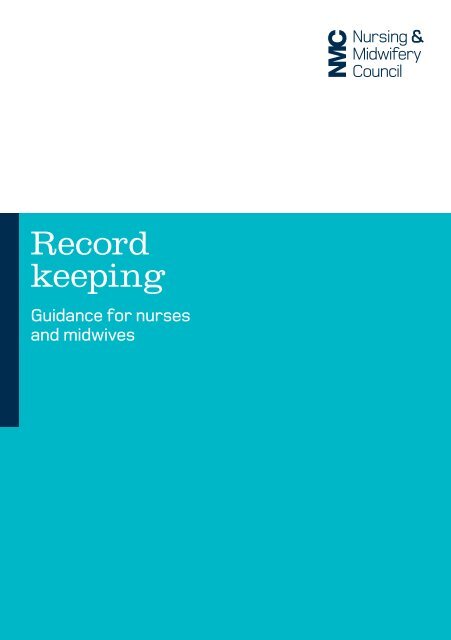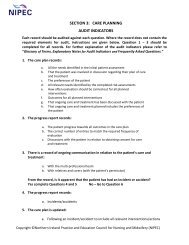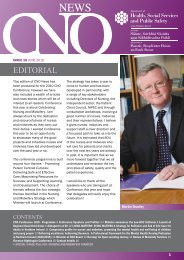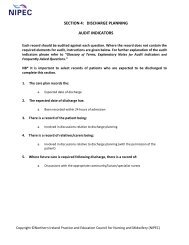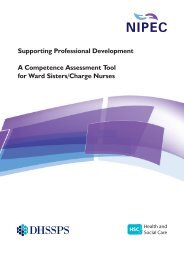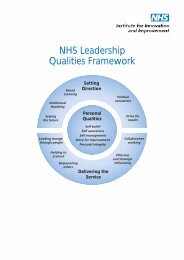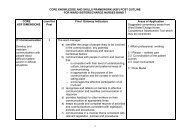Record keeping Guidance for nurses and midwives 2010 - NIPEC
Record keeping Guidance for nurses and midwives 2010 - NIPEC
Record keeping Guidance for nurses and midwives 2010 - NIPEC
You also want an ePaper? Increase the reach of your titles
YUMPU automatically turns print PDFs into web optimized ePapers that Google loves.
<strong>Record</strong><br />
<strong>keeping</strong><br />
<strong>Guidance</strong> <strong>for</strong> <strong>nurses</strong><br />
<strong>and</strong> <strong>midwives</strong><br />
1
We are the nursing <strong>and</strong> midwifery regulator <strong>for</strong> Engl<strong>and</strong>,<br />
Wales, Scotl<strong>and</strong>, Northern Irel<strong>and</strong> <strong>and</strong> the Isl<strong>and</strong>s.<br />
• We exist to safeguard the health <strong>and</strong> wellbeing of<br />
the public.<br />
• We set the st<strong>and</strong>ards of education, training <strong>and</strong> conduct<br />
that <strong>nurses</strong> <strong>and</strong> <strong>midwives</strong> need to deliver high quality<br />
healthcare consistently throughout their careers.<br />
• We ensure that <strong>nurses</strong> <strong>and</strong> <strong>midwives</strong> keep their skills<br />
<strong>and</strong> knowledge up to date <strong>and</strong> uphold the st<strong>and</strong>ards<br />
of their professional code.<br />
• We ensure that <strong>midwives</strong> are safe to practise by setting<br />
rules <strong>for</strong> their practice <strong>and</strong> supervision.<br />
• We have fair processes to investigate allegations made<br />
against <strong>nurses</strong> <strong>and</strong> <strong>midwives</strong> who may not have followed<br />
the code.<br />
2 <strong>Record</strong> <strong>keeping</strong>
<strong>Record</strong> <strong>keeping</strong>:<br />
<strong>Guidance</strong> <strong>for</strong> <strong>nurses</strong> <strong>and</strong> <strong>midwives</strong><br />
The way in which <strong>nurses</strong> <strong>and</strong> <strong>midwives</strong> keep records is usually<br />
set by their employer. The Nursing <strong>and</strong> Midwifery Council (NMC)<br />
recognises that, because of this, <strong>nurses</strong> <strong>and</strong> <strong>midwives</strong> may use<br />
different methods <strong>for</strong> <strong>keeping</strong> records. However, the principles<br />
of good record <strong>keeping</strong> are well established, <strong>and</strong> should reflect<br />
the core values of individuality <strong>and</strong> partnership working.<br />
Good record <strong>keeping</strong> is an integral part of nursing <strong>and</strong><br />
midwifery practice, <strong>and</strong> is essential to the provision of safe<br />
<strong>and</strong> effective care. It is not an optional extra to be fitted in if<br />
circumstances allow.<br />
National programmes <strong>for</strong> the use of in<strong>for</strong>mation communication<br />
technology <strong>and</strong> electronic record <strong>keeping</strong> are being introduced<br />
throughout the UK. Although electronic records are evolving,<br />
it is clear from <strong>nurses</strong> <strong>and</strong> <strong>midwives</strong> that paper-based records<br />
are still commonly used. This guidance applies to both paper <strong>and</strong><br />
electronic records. It explains what we expect from all <strong>nurses</strong><br />
<strong>and</strong> <strong>midwives</strong>.<br />
1
Good record <strong>keeping</strong>, whether at an individual, team or<br />
organisational level, has many important functions. These include<br />
a range of clinical, administrative <strong>and</strong> educational uses such as:<br />
• helping to improve accountability<br />
• showing how decisions related to patient care were made<br />
• supporting the delivery of services<br />
• supporting effective clinical judgements <strong>and</strong> decisions<br />
• supporting patient care <strong>and</strong> communications<br />
• making continuity of care easier<br />
• providing documentary evidence of services delivered<br />
• promoting better communication <strong>and</strong> sharing of in<strong>for</strong>mation<br />
between members of the multi-professional healthcare team<br />
• helping to identify risks, <strong>and</strong> enabling early detection<br />
of complications<br />
• supporting clinical audit, research, allocation of resources<br />
<strong>and</strong> per<strong>for</strong>mance planning<br />
• helping to address complaints or legal processes.<br />
2 <strong>Record</strong> <strong>keeping</strong>
The Data Protection Act 1998 defines a health record as<br />
“consisting of in<strong>for</strong>mation about the physical or mental health<br />
or condition of an identifiable individual made by or on behalf<br />
of a health professional in connection with the care of<br />
that individual”.<br />
The principles of good record <strong>keeping</strong> apply to all types of<br />
records, regardless of how they are held. These can include:<br />
• h<strong>and</strong>written clinical notes<br />
• emails<br />
• letters to <strong>and</strong> from other health professionals<br />
• laboratory reports<br />
• x-rays<br />
• printouts from monitoring equipment<br />
• incident reports <strong>and</strong> statements<br />
• photographs<br />
• videos<br />
• tape-recordings of telephone conversations<br />
• text messages.<br />
3
Principles of good record <strong>keeping</strong><br />
1 H<strong>and</strong>writing should be legible.<br />
2 All entries to records should be signed. In the case of written<br />
records, the person’s name <strong>and</strong> job title should be printed<br />
alongside the first entry.<br />
3 In line with local policy, you should put the date <strong>and</strong> time on all<br />
records. This should be in real time <strong>and</strong> chronological order,<br />
<strong>and</strong> be as close to the actual time as possible.<br />
4 Your records should be accurate <strong>and</strong> recorded in such a way<br />
that the meaning is clear.<br />
5 <strong>Record</strong>s should be factual <strong>and</strong> not include unnecessary<br />
abbreviations, jargon, meaningless phrases or irrelevant<br />
speculation.<br />
6 You should use your professional judgement to decide what<br />
is relevant <strong>and</strong> what should be recorded.<br />
7 You should record details of any assessments <strong>and</strong> reviews<br />
undertaken, <strong>and</strong> provide clear evidence of the arrangements<br />
you have made <strong>for</strong> future <strong>and</strong> ongoing care. This should<br />
alsoinclude details of in<strong>for</strong>mation given about care<br />
<strong>and</strong> treatment.<br />
8 <strong>Record</strong>s should identify any risks or problems that have arisen<br />
<strong>and</strong> show the action taken to deal with them.<br />
4 <strong>Record</strong> <strong>keeping</strong>
9 You have a duty to communicate fully <strong>and</strong> effectively with your<br />
colleagues, ensuring that they have all the in<strong>for</strong>mation they<br />
need about the people in your care.<br />
10 You must not alter or destroy any records without being<br />
authorised to do so.<br />
11 In the unlikely event that you need to alter your own or<br />
another healthcare professional’s records, you must give<br />
your name <strong>and</strong> job title, <strong>and</strong> sign <strong>and</strong> date the original<br />
documentation. You should make sure that the alterations<br />
you make, <strong>and</strong> the original record, are clear <strong>and</strong> auditable.<br />
12 Where appropriate, the person in your care, or their carer,<br />
should be involved in the record <strong>keeping</strong> process.<br />
13 The language that you use should be easily understood<br />
by the people in your care.<br />
14 <strong>Record</strong>s should be readable when photocopied or scanned.<br />
15 You should not use coded expressions of sarcasm or<br />
humorous abbreviations to describe the people in your care.<br />
16 You should not falsify records.<br />
5
Confidentiality<br />
17 You need to be fully aware of the legal requirements <strong>and</strong><br />
guidance regarding confidentiality, <strong>and</strong> ensure your practice<br />
is in line with national <strong>and</strong> local policies.<br />
18 You should be aware of the rules governing confidentiality<br />
in respect of the supply <strong>and</strong> use of data <strong>for</strong><br />
secondary purposes.<br />
19 You should follow local policy <strong>and</strong> guidelines when using<br />
records <strong>for</strong> research purposes.<br />
20 You should not discuss the people in your care in places where<br />
you might be overheard. Nor should you leave records, either<br />
on paper or on computer screens, where they might be seen<br />
by unauthorised staff or members<br />
of the public.<br />
21 You should not take or keep photographs of any person,<br />
or their family, that are not clinically relevant.<br />
6 <strong>Record</strong> <strong>keeping</strong>
Access<br />
22 People in your care should be told that in<strong>for</strong>mation on their<br />
health records may be seen by other people or agencies<br />
involved in their care.<br />
23 People in your care have a right to ask to see their own health<br />
records. You should be aware of your local policy <strong>and</strong> be able<br />
to explain it to the person.<br />
24 People in your care have the right to ask <strong>for</strong> their in<strong>for</strong>mation<br />
to be withheld from you or other health professionals. You<br />
must respect that right unless withholding such in<strong>for</strong>mation<br />
would cause serious harm to that person or others.<br />
25 If you have any problems relating to access or record <strong>keeping</strong>,<br />
such as missing records or problems accessing records, <strong>and</strong><br />
you cannot sort out the problem yourself, you should report<br />
the matter to someone in authority. You should keep a record<br />
that you have done so.<br />
26 You should not access the records of any person, or their<br />
family, to find out personal in<strong>for</strong>mation that is not relevant<br />
to their care.<br />
7
Disclosure<br />
27 In<strong>for</strong>mation that can identify a person in your care must<br />
not be used or disclosed <strong>for</strong> purposes other than healthcare<br />
without the individual’s explicit consent. However, you can<br />
release this in<strong>for</strong>mation if the law requires it, or where there<br />
is a wider public interest.<br />
28 Under common law, you are allowed to disclose in<strong>for</strong>mation<br />
if it will help to prevent, detect, investigate or punish serious<br />
crime or if it will prevent abuse or serious harm to others.<br />
In<strong>for</strong>mation systems<br />
29 You should be aware of, <strong>and</strong> know how to use, the in<strong>for</strong>mation<br />
systems <strong>and</strong> tools that are available to you in your practice.<br />
30 Smartcards or passwords to access in<strong>for</strong>mation systems<br />
must not be shared. Similarly, do not leave systems open<br />
to access when you have finished using them.<br />
31 You should take reasonable measures to check that your<br />
organisation’s systems <strong>for</strong> recording <strong>and</strong> storing in<strong>for</strong>mation,<br />
whether by computer, email, fax or any other electronic<br />
means, are secure. You should ensure you use the system<br />
appropriately, particularly in relation to confidentiality.<br />
8 <strong>Record</strong> <strong>keeping</strong>
Personal <strong>and</strong> professional knowledge <strong>and</strong> skills<br />
32 You have a duty to keep up to date with, <strong>and</strong> adhere to,<br />
relevant legislation, case law, <strong>and</strong> national <strong>and</strong> local policies<br />
relating to in<strong>for</strong>mation <strong>and</strong> record <strong>keeping</strong>.<br />
33 You should be aware of, <strong>and</strong> develop, your ability to<br />
communicate effectively within teams. The way you record<br />
in<strong>for</strong>mation <strong>and</strong> communicate is crucial. Other people will<br />
rely on your records at key communication points, especially<br />
during h<strong>and</strong>over, referral <strong>and</strong> in shared care.<br />
34 By auditing records <strong>and</strong> acting on the results, you can assess<br />
the st<strong>and</strong>ard of the record <strong>keeping</strong> <strong>and</strong> communications.<br />
This will allow you to identify any areas where improvements<br />
might be made.<br />
9
Further reading<br />
This guidance is supported by further notes <strong>and</strong> frequently asked<br />
questions, along with the NMC advice sheet Confidentiality (2009),<br />
which are available at www.nmc-uk.org<br />
Further in<strong>for</strong>mation can be found in the following documents <strong>and</strong><br />
publications which are available on various external websites.<br />
• National Health Service (Venereal Disease) Regulations<br />
(SI 1974/29)<br />
• Access to Health <strong>Record</strong>s Act 1990<br />
• Computer Misuse Act 1990<br />
• Civil Evidence Act 1995<br />
• The Caldicott Committee Report on the Review of Patient-<br />
Identifiable In<strong>for</strong>mation, Department of Health (1997)<br />
• Access to Medical Reports Act 1998<br />
• Data Protection Act 1998<br />
• Human Rights Act 1988<br />
• Road Traffic Act 1998<br />
• Data Protection (Processing of Sensitive Personal Data)<br />
Order 2000<br />
10 <strong>Record</strong> <strong>keeping</strong>
• Electronic Communications Act 2000<br />
• Freedom of In<strong>for</strong>mation Act 2000<br />
• Freedom of In<strong>for</strong>mation (Scotl<strong>and</strong>) Act 2002<br />
• Communications Act 2003<br />
• Confidentiality: NHS Code of Practice (2003)<br />
• In<strong>for</strong>mation Security Management: NHS Code of<br />
Practice (2007)<br />
• NHS In<strong>for</strong>mation Governance: <strong>Guidance</strong> on Legal <strong>and</strong><br />
Professional Obligations (2007)<br />
• Counter-Terrorism Act 2008<br />
• Human Fertilisation <strong>and</strong> Embryology Act 2008<br />
• <strong>Record</strong>s Management: NHS Code of Practice (Scotl<strong>and</strong>)<br />
Version 1.0 (2008)<br />
11
This guidance on record <strong>keeping</strong> was published in July 2009,<br />
<strong>for</strong> implementation from 1 August 2009. It replaces Guidelines<br />
<strong>for</strong> records <strong>and</strong> record <strong>keeping</strong> (NMC 2002) <strong>and</strong> the NMC advice<br />
sheet on record <strong>keeping</strong> (NMC 2007).<br />
The current design was introduced in April <strong>2010</strong>, however the<br />
content has not changed.<br />
Further in<strong>for</strong>mation to support this guidance is available<br />
on our website, www.nmc-uk.org<br />
This guidance will be reviewed in 2012.<br />
12 <strong>Record</strong> <strong>keeping</strong>
Contact us<br />
Nursing <strong>and</strong> Midwifery Council<br />
23 Portl<strong>and</strong> Place<br />
London W1B 1PZ<br />
020 7333 9333<br />
advice@nmc-uk.org<br />
www.nmc-uk.org<br />
PB-RCKP-A5-0410<br />
14 <strong>Record</strong> <strong>keeping</strong>


